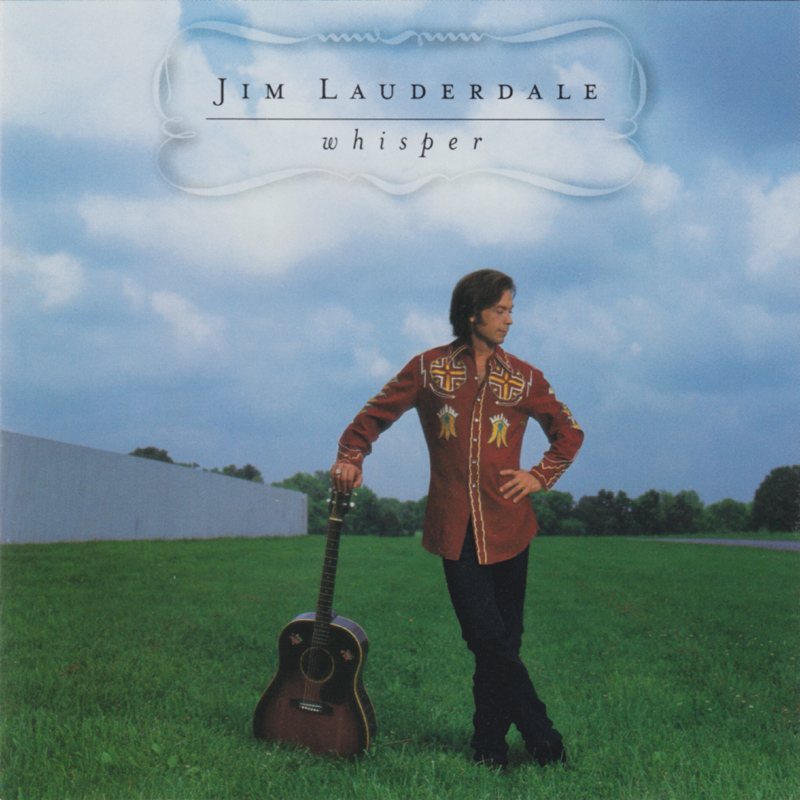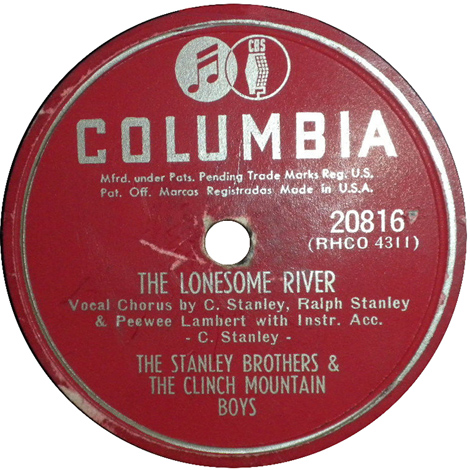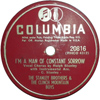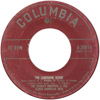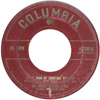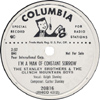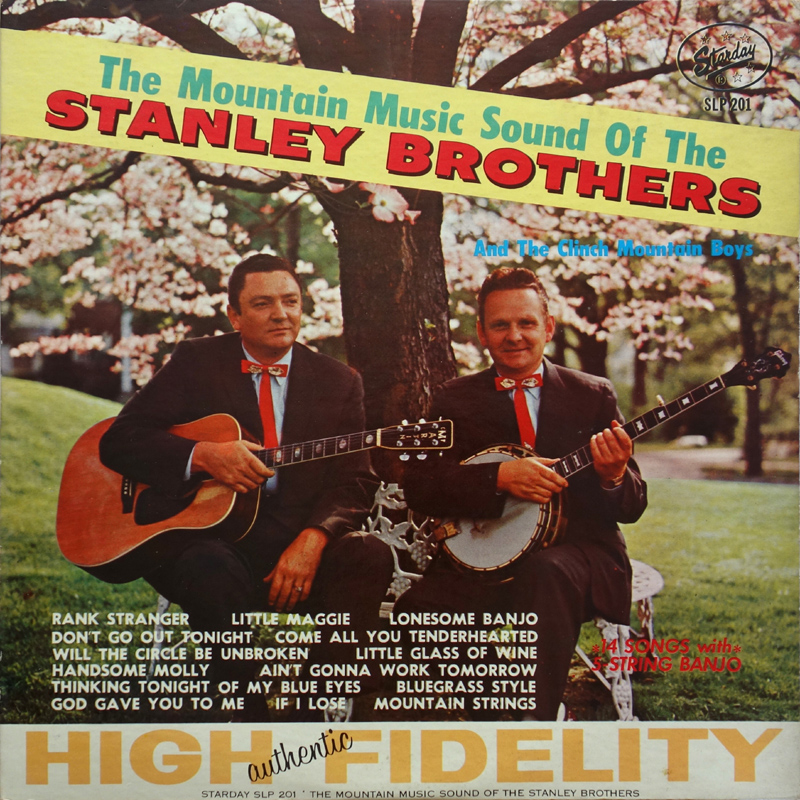- Bill Gatton Chevy Show
- Carter Stanley Interview - 1966
- Jim Kent's film 'Ralph Stanley's Bluegrass Festival'
- New WCYB Recording
- Pound Va. 1972 - Video
- Replica Rebel T-Shirt
- R.I.P. Ralph
- Roy Lee Centers Last Show
- Song & Memory Books
- Stanley Brothers - WCYB Acetate
- Stanley Standard - Carter Stanley Memorial Issue
- Suwannee River Jamboree
- Up In The Cloud - 1957-62
The Stanley Brothers - The Lonesome River / I'm A Man Of Constant Sorrow
(Columbia 20816) 1951
These two signature songs of the Stanley's were recorded at their third session for Columbia in Nov 1950 (contrary to what Ralph says below).
Ralph:- "For our second session for Columbia, we finally got around to doing the old ballads that featured me singing lead. First one we did was 'Man Of Constant Sorrow', and I was scared to death. It didn't matter that I'd done it a hundred or more times on the radio and on the road. This was the big time, and the studio light was blinking and there was no one but me to sing it. That's what had me worried: singing alone. Harmony singing didn't botherme a bit, but getting behind that mic on your own was different. You're it."
"Our arrangement was different from any other way we'd heard that song. We changed the tempo and really made it move. I worried my lines like my dad used to out on the porch, but I set it to a new timing. It fit the words better, because it's about a man on the run. He can't sit still, can't be smoothed, can't slow down. It's about trying to outrun your troubles and never finding rest. Even a train ain't moving fast enough. There's no way out, but he keeps moving anyhow."
"What really made the song move was the fiddle playing Les Woodie done. Listen to his fiddle hug the meody line and you can hear the worries chasing that man. They won't leave him no matter where he goes. Les once told me he was never happy with the breaks he done on that, but he should've been well satisfied. He set the standard for every fiddle player who's played 'Man Of Constant Sorrow' since."
"If anyone came up short on that record it was me. I've never been satisfied with the way I sang on that. I can tell from my voice I wasn't able to out all my feeling in it, because I was so scared. After you get seasoned and you get used to things, you can put everything you've got in there. I was holding back. When I listen to that record now, I hear how scared I was more than anything. Maybe the fear I hear in my voice fit the story of the song. I do know that the first recording I did on 'Man Of Constant Sorrow' helped save the song from dying out. The rcord on Columbia gave it a new life, and that song has followed me ever since, and I still sing it every show I do.[1]
In interviews, both Carter and Ralph recalled that they learnt Man of Constant Sorrow from their father, who used to sometimes sing it on the porch. It became somewhat of a signature tune for Ralph, who recorded it three more times: once for King (Sing Everybody's Country Favorites), Rebel (Play Requests) and his final American Icon - The Definitive Collection CD. There are also numerous live versions.
The song was first released by Emry Arthur in 1928, who had learnt it from his neighbour R.D. Burnett (aka Dick Burnett). Dick had published the song as Farewell Song in a booklet he produced circa 1913, called 'Songs Sung by R.D. Burnett - The Blind Man - Montcello, Kentucky'.[2] When asked about the song in an interview with Charles Wolfe, he replied vaguely: "No, I think I got the ballet [sic] from somebody - I dunno. It may be my song..."[3]. The Wikepedia entry for the song, lists some possible antecedents.
Ralph: "'Man of Constant Sorrow' is probably two or three hundred years old. But the first time I heard it when I was y'know, like a small boy, my daddy - my father - he had some of the words to it, and I heard him sing it, and we - my brother and me - we put a few more words to it, and brought it back in existence. I guess if it hadn't been for that it'd have been gone forever. I'm proud to be the one that brought that song back, because I think it's wonderful."
Not to be overlooked, Lonesome River is another of Carter's classic songs, with fabulous lysrics, a tremendously mournful lead vocal delivery, and powerful hi-baritone/tenor harmony on the chorus. Ralph later recut it on his A Man And His Music LP with John Duffey filling Pee Wee Lambert's mandolin and hi-baritone shoes. He also cut a rather dire version with Bob Dylan in 1998 on the Clinch Mountain Country album.
Both sides of the original release can be found on The Complete Columbia Stanley Brothers CD.
For a detailed breakdown and background to the Stanley's session, check Gary B. Reid's The Music Of The Stanley Brothers book, pages 28-30 and 37.
| Track: |
Title: |
Time: |
Date: |
Original Release: |
|||||||||||||||||
|---|---|---|---|---|---|---|---|---|---|---|---|---|---|---|---|---|---|---|---|---|---|
| A-1 |
The Lonesome River |
02:43 |
03 Nov 1950 |
Columbia 20816 |
|||||||||||||||||
| C. Stanley |
|||||||||||||||||||||
| Ld Vcl - Gtr | Tn Vcl - Bjo | Hi Bt Vcl - Mnd | Fid | Bs | |||||||||||||||||
| Carter Stanley |
Ralph Stanley |
Darrell 'Pee Wee' Lambert |
Les Woodie |
Ernest 'Ernie' Newton |
|||||||||||||||||
| B-1 |
I'm A Man Of Constant Sorrow |
02:55 |
03 Nov 1950 |
Columbia 20816 |
|||||||||||||||||
| R.D. Burnett |
|||||||||||||||||||||
| Gtr | Ld Vcl - Bjo | Mnd | Fid | Bs | |||||||||||||||||
| Carter Stanley |
Ralph Stanley |
Darrell 'Pee Wee' Lambert |
Les Woodie |
Ernest 'Ernie' Newton |
|||||||||||||||||
Other artwork / related images:
[1] Ralph Stanley and Eddie Dean's book 'Man Of Constant Sorrow' (p.147-148)
[2] Wayne Erbsen's book 'Rural Roots Of Bluegrass - Songs, Stories & History' (p. 123)
[3] "Man of Constant Sorrow - Richard Burnett's Story,", Old Time Music, No. 10 (Autumn 1973) (p. 8) - see: http://www.bobdylanroots.com/farewell.html

